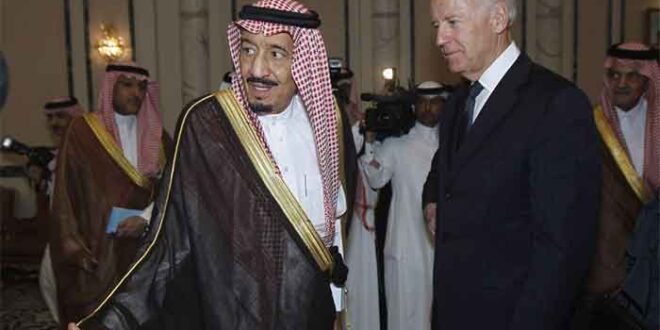“This war has to end,” President Biden intoned in his first major foreign policy address at the State Department in early February 2021. He wasn’t talking about the war in Afghanistan. Rather it was the bloody, mostly one-sided, six-year battering led by Saudi Arabia and the United Arab Emirates against the Houthi insurgency in Yemen. A war underwritten by U.S. arms sales and training that has cost 130,000 lives (25% of them children), displaced 3.6 million people and plunged the country into the worst humanitarian crisis in the world.
Talk is cheap in the Biden administration but the president appeared to want to make things clear as he added, “And to underscore our commitment, we are ending all American support for offensive operations.”
As a sound bite, it was fine. However, neither he nor members of his administration would say exactly what was meant by “offensive operations,” an all-important detail because the Saudis claimed they only acted defensively.
Seven months later it’s clear that, as with so many other highfalutin pronouncements by the president, this one was just more hot air.
Months of silence. A week after Biden’s February foreign policy address, 47 organizations and 35 experts and prominent individuals urged him to “block all relevant weapons, equipment, training, services, logistical, maintenance and other activities,” including 28 previously approved weapons transfers and other military support to Saudi Arabia and the United Arab Emirate worth a total of $36.5 billion. They rightly worried that the “offensive operations” reference left an enormous hole in his seeming readiness to change U.S. policy regarding Yemen.
Two weeks later, another letter, signed by 41 members of Congress, was posted to the president asking him, among other questions: what difference there is between an offensive and defensive weapon; under what legal authority the administration was authorized to be involved in the war; what role the Trump administration was playing in the war when Biden took over; and which activities would be discontinued?
“Congress has repeatedly invoked its constitutional war powers authority by voting to end unconstitutional U.S. participation in this war,” the letter said.
The signers set a March 25 deadline for a reply, a date six years to the day after the Saudi led coalition had launched the war.
The answer did not come until September.
Bipartisanship lives. In a 2019 primary debate, candidate Biden sounded astoundingly critical of the Saudis saying that “there is very little social value in the present government of Saudi Arabia.”
However as president, Biden joined the Obama and Trump administrations in proving just how bipartisan Democrats and Republicans can be when it comes to arms sales to the Saudis.
For years now, members of the progressive wing of the Democratic Party, including Bernie Sanders, had repeatedly introduced measures to end U.S. support for the war. It was only after the 2018 assassination of journalist Jamal Khashoggi that Congress managed to pass measures to block Saudi weapons deals and directed President Trump to cut off support for the war. Trump vetoed the legislation, but it appeared that the Khashoggi murder had changed some minds in Congress.
But memories are short in D.C. when multi-million dollar arms sales are involved.
Saudi killing gets go-ahead. In September, the State Department gave Saudi Arabia permission to enter a $500 million contract to support the Royal Saudi Air Force’s fleet of Apache and Blackhawk attack helicopters, as well as a future fleet of Chinook helicopters. The deal includes service of the vehicles and training of 350 U.S. contractors to do the work for two years, plus two U.S. government staff to oversee it. One cannot help wondering how many Yemeni civilians the Saudis can kill for a quarter billion dollars or how much profit will be made by the stateside contractors.
The State Department accompanied its announcement of this deal with a statement that read, “The proposed sale will support U.S. foreign policy and national security objectives by helping to improve the security of a friendly country that continues to be an important force for political stability and economic growth in the Middle East.”
These were exceptionally kind words for the Saudi monarchy, the only government on planet earth that to this day uses beheadings as a form of execution against persecuted religious minorities, political opponents and criminals alike.
In hindsight it is clear the Biden administration’s differentiation between offensive and defensive war was nothing but a smokescreen to create the space to pursue military cooperation with the Saudis at the cost of Yemeni lives. For without U.S. intelligence, maintenance, training and servicing, the Saudis would not have an air force. Their dependency on the U.S. war machine could have been used to force them to end their blockade of Yemen, a blockade which is causing mass starvation, a national medical emergency and a deep fuel crisis. Instead the war will continue as no doubt will President Biden’s crocodile tears.
 Eurasia Press & News
Eurasia Press & News



